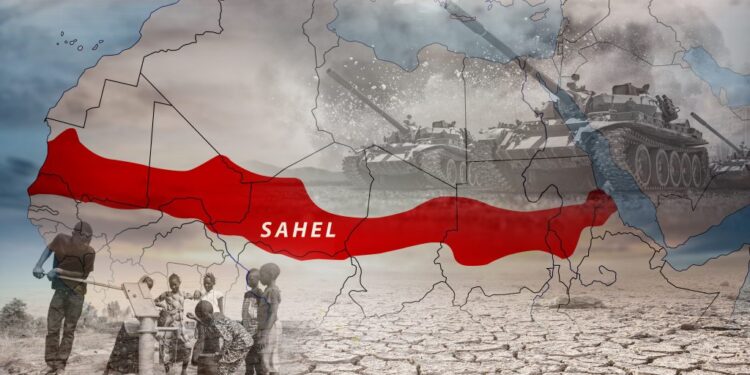The Sahel region has emerged as a critical theatre for global power competition, where strategic interests intersect with some of the world’s most persistent terrorist threats. As Western powers recalibrate their engagement, Russia, China, and, to a lesser extent, Ukraine, have stepped into the vacuum, each shaping the region’s counterterrorism landscape in distinct and consequential ways.
Russia: Proxy War, Private Armies, and Geopolitical Capital
Russia’s deepening engagement in the Sahel, particularly in Mali, Burkina Faso, and Niger, reflects a broader pivot to Africa following its geopolitical isolation after the invasion of Ukraine in 2022. The deployment of the Africa Corps—formerly Wagner Group—has positioned Russia not only as a military partner but also as a counterbalance to unpopular Western interventions (Global Terrorism Index 2025).
In Mali, Russia has provided direct military assistance through Africa Corps troops, who arrived in late 2021 to assist in counterinsurgency operations. Despite their brutal tactics, these forces gained favour among segments of the Malian public and military, disillusioned with ineffective French and UN peacekeeping missions. Opinion polls in early 2024 reflected an 82% approval rating for Russian involvement in Mali, although this sentiment has been tested by events such as the July 2024 Tuareg rebel ambush that killed at least 84 Russian personnel (GTI 2025).
Russia’s involvement, however, is not solely security-oriented. The country has strategically leveraged military engagement to extract economic value, particularly in mining and infrastructure deals, while using disinformation campaigns to bolster anti-Western narratives. Coordinated influence operations—spread via social media, local influencers, and Russian-supported media—have succeeded in reshaping public sentiment in Burkina Faso and Mali, dramatically increasing negative perceptions of France (GTI 2025).
Nevertheless, Russia’s role is precariously balanced. Its operations in Africa are increasingly strained by military setbacks in Ukraine and a potential loss of its logistical hub in Syria. The collapse of the Assad regime has raised concerns about continued access to Mediterranean bases like Tartous, prompting Russia to reposition over 100 military vehicles from Syria to Mali in early 2025 (GTI 2025). Moreover, Ukraine’s involvement—via reported intelligence sharing and possible drone supplies to Tuareg rebels—hints at a nascent proxy conflict unfolding in the Sahel, echoing broader East-West tensions (GTI 2025).
China: Economic Interests with Security Implications
China’s growing presence in the Sahel is primarily economically motivated, but it is increasingly adopting a security-conscious posture to safeguard its investments. In Burkina Faso, China expanded its footprint following the 2019 cessation of relations with Taiwan, securing mining licences and deepening ties with the military government (GTI 2025).
While China’s engagement remains largely non-military, it has pledged 1 billion Yuan (~$136 million) to train 7,000 African security personnel under its Global Security Initiative, signalling a broader commitment to regional stability (GTI 2025). The move to support a continental standby force marks a shift in Chinese policy, hinting at future peacekeeping or counterinsurgency roles where its investments are under threat.
In Niger, a key uranium supplier, Chinese companies are resuming operations and expanding influence amid the post-coup power vacuum. As global uranium demand surges—especially in China—Beijing’s interest in Niger is poised to grow, further entangling it in the region’s complex security dynamics (GTI 2025).
United States: A Strategic Retrenchment Amid Growing Influence
Despite setbacks following the coups in Mali, Burkina Faso, and Niger, the United States has maintained considerable influence, especially through sustained economic and diplomatic engagement. In Mali, for example, US bilateral aid increased from $132 million in 2019 to over $156 million in 2020, despite deteriorating political stability (GTI 2025). US influence paradoxically grew even as European engagement faltered.
Post-coup restrictions have limited direct military support, but the US has adapted by shifting its counterterrorism focus toward cooperation with Côte d’Ivoire and Benin, and recently returned Special Forces to Chad (GTI 2025). This regional reconfiguration aims to maintain strategic access while reducing the visibility of US military footprints in politically unstable countries.
However, the US is also facing shrinking public approval in parts of the Sahel. In Burkina Faso and Mali, support for the US has declined by 9% and 15% respectively, contrasting with growing sentiment in other parts of the region (GTI 2025).
France and the West: A Diminishing Legacy
France, once the dominant security actor in the Sahel, has experienced a dramatic collapse in influence. Expelled from Mali and Burkina Faso, and facing revocations of mining licences in Niger, French capacity to shape security outcomes has significantly waned. This decline has been exacerbated by anti-French sentiment, inflamed by Russian disinformation and the failures of past interventions (GTI 2025).
The departure of 13,000 French and UN troops has left a major security void, now partially filled by Russian PMCs and increasingly by regional militaries emboldened by external support. Western efforts to maintain influence are now largely economic or diplomatic, with military assistance severely curtailed (GTI 2025).
Conclusion
Across the Sahel, military regimes in Mali, Burkina Faso, and Niger have framed their engagement with non-Western powers as part of a broader effort to reclaim sovereignty. The use of private military contractors allows governments to sidestep conditions often imposed by Western aid and military support.
However, this new model of security cooperation—dominated by Russia’s Africa Corps and China’s economic diplomacy—raises concerns of simply replacing one form of external dependency with another. Without genuine regional cooperation and internal reforms, these partnerships risk entrenching authoritarianism while failing to deliver sustainable security improvements. The Sahel is not merely a zone of instability—it is now a battleground for global influence, where terrorism, state collapse, and superpower rivalry converge. The outcomes of these contests will reverberate far beyond the region, shaping the global security architecture for years to come. As Western powers recalculate while Russia and China entrench, the people of the Sahel remain caught in the crosshairs of a geopolitical storm that shows no signs of abating.
Reference
Global Terrorism Index 2025. Institute for Economics & Peace. (2025).






























